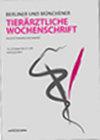A self-assessment tool to improve poultry farm biosecurity regarding avian influenza
IF 0.6
4区 农林科学
Q4 VETERINARY SCIENCES
Berliner und Munchener tierarztliche Wochenschrift
Pub Date : 2020-08-06
DOI:10.2376/1439-0299-2020-17
引用次数: 3
Abstract
Highly pathogenic avian influenza (HPAI) poses an important threat to poultry farming and the whole value chain. Since biosecurity is a major strategy to reduce the risk of HPAI virus introduction into farms and poultry flocks, a self-assessment tool for farmers concerning their farm-specific biosecurity management was developed. It is based on a questionnaire referring to risk factors retrieved from the literature or elaborated by experts, respectively. The risk factors are related to farm-, biosecurity- and animal health-management. Their epidemiological relevance is expressed through weights that were determined by an expert panel in a two-stage Delphi approach. The overall risk of a farm is estimated as the complementary to the percentage compliance with the measures assuring a maximum biosecurity as represented by the compiled questions and their respective weights. The tool is offered as a free of charge, open-access web - based tool, the so-called AI-Risikoampel (AI-Risk Traffic Light), an online anonymous risk-check, which does not only allow to elicit farm-specific optimization potentials concerning biosecurity, but also generates a farm-specific to-do list with tasks ranked according to relevance. Biosecurity gaps may thus be closed by the farmer, possibly also in cooperation with a veterinarian or consultant. The to-date experience concerning the acceptance of the tool and the user statistics are presented.改善家禽农场禽流感生物安全的自我评估工具
高致病性禽流感(HPAI)对家禽养殖业和整个价值链构成重大威胁。由于生物安全是减少高致病性病毒传入农场和家禽群风险的一项主要战略,因此开发了一种针对农场特有生物安全管理的农民自我评估工具。它是基于参考从文献中检索的风险因素或由专家分别阐述的问卷调查。风险因素与农场、生物安全和动物健康管理有关。其流行病学相关性通过由专家小组采用两阶段德尔菲法确定的权重来表示。一个农场的总体风险是对确保最大生物安全的措施的遵守百分比的补充估计,这些措施由汇编的问题及其各自的权重表示。该工具是一种免费的、开放访问的基于网络的工具,即所谓的AI-Risikoampel (ai -风险交通灯),这是一种在线匿名风险检查,它不仅可以引发有关生物安全的特定农场优化潜力,还可以生成一个特定农场的待办事项列表,其中根据相关性排列任务。因此,农民可以通过与兽医或顾问的合作来弥补生物安全缺口。介绍了迄今为止有关接受该工具的经验和用户统计数据。
本文章由计算机程序翻译,如有差异,请以英文原文为准。
求助全文
约1分钟内获得全文
求助全文
来源期刊
CiteScore
0.90
自引率
0.00%
发文量
0
审稿时长
18-36 weeks
期刊介绍:
The Berliner und Münchener Tierärztliche Wochenschrift is an open access, peer-reviewed journal that publishes contributions on all aspects of veterinary public health and its related subjects, such as epidemiology, bacteriology, virology, pathology, immunology, parasitology, and mycology. The journal publishes original research papers, review articles, case studies and short communications on farm animals, companion animals, equines, wild animals and laboratory animals. In addition, the editors regularly commission special issues on topics of major importance. The journal’s articles are published either in German or English and always include an abstract in the other language.

 求助内容:
求助内容: 应助结果提醒方式:
应助结果提醒方式:


